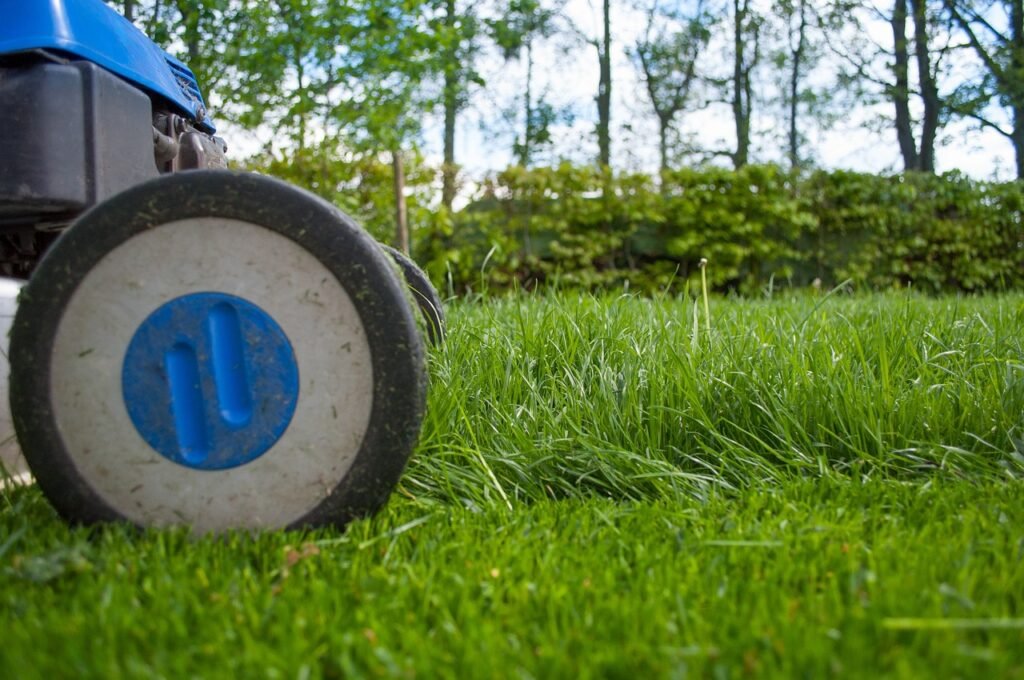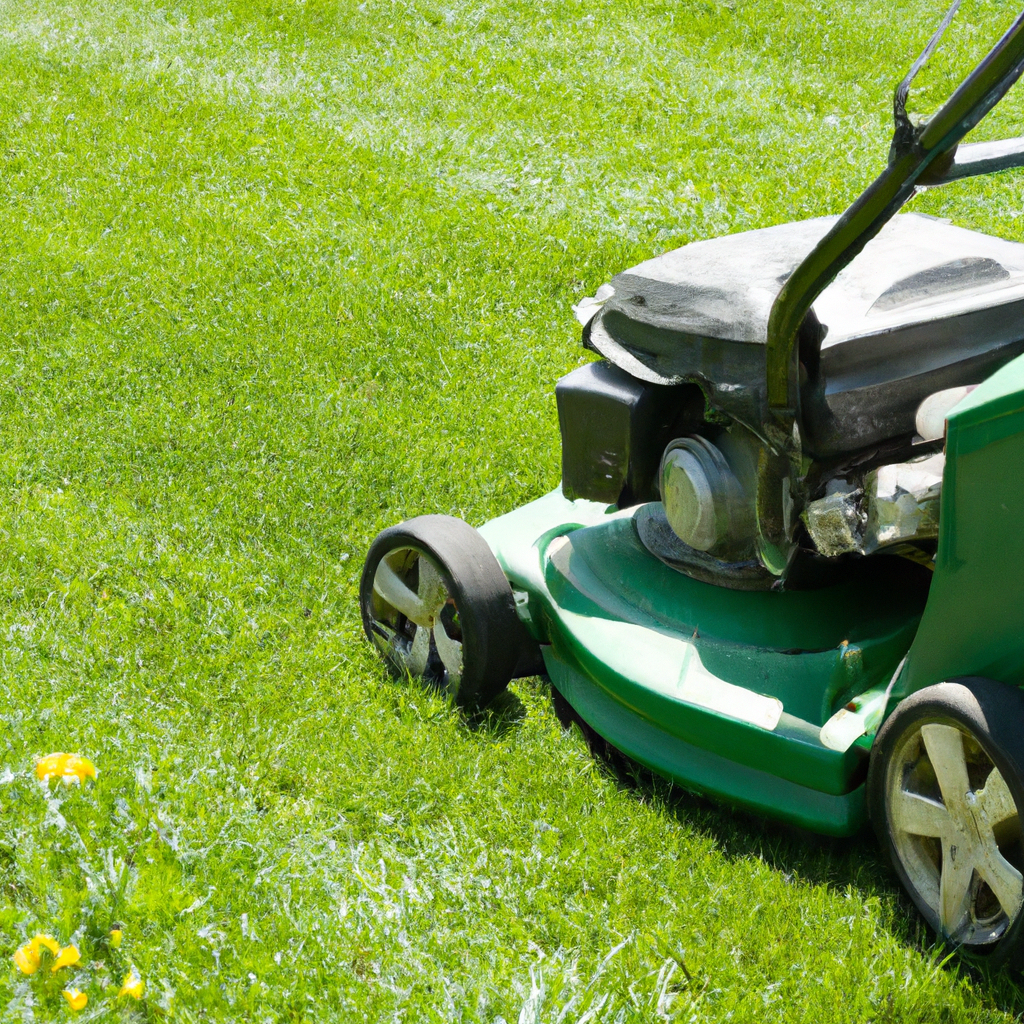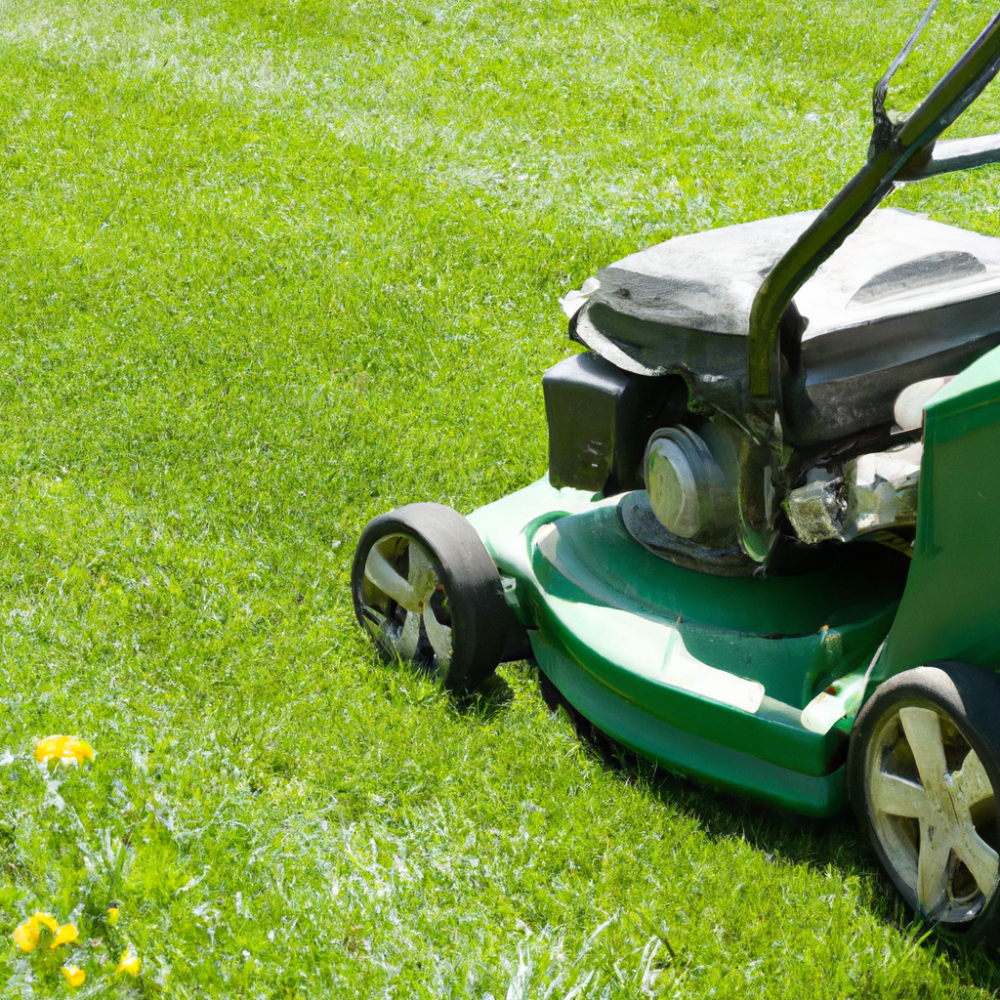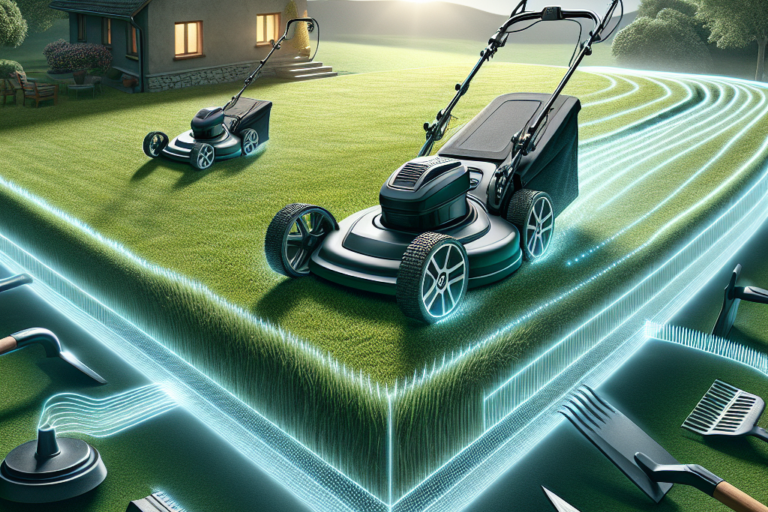Are you tired of the hassle and noise of using a gas-powered lawn mower? Have you been wondering if switching to an electric lawn mower is worth it in terms of performance? Look no further! In this article, we will explore the differences between electric and gas lawn mowers and give you the lowdown on which one comes out on top when it comes to performance. Whether you have a small suburban yard or a sprawling lawn, we’ve got you covered with all the information you need to make an informed decision. Say goodbye to the noisy gas mower and say hello to a quieter, more eco-friendly alternative without sacrificing performance.

Maintenance and Operation
Ease of Maintenance
When it comes to maintenance, electric lawn mowers have a clear advantage. Unlike gas mowers, electric mowers do not require regular oil changes, spark plug replacements, or air filter cleanings. This not only saves you time and effort but also eliminates the need to store and dispose of potentially harmful gasoline and oil. Electric mowers also have fewer moving parts, reducing the risk of mechanical failures and the need for costly repairs.
Ease of Operation
Operating an electric lawn mower is as simple as pushing a button or flipping a switch. Unlike gas mowers that require manual pulling to start the engine, electric mowers offer instant start-up, eliminating the frustration and hassle of dealing with a stubborn pull cord. Moreover, electric mowers tend to be lighter and easier to maneuver, making them more user-friendly, especially for those with limited strength or mobility.
Noise Level
One of the standout advantages of electric mowers is their significantly lower noise level compared to gas mowers. Electric motors produce minimal noise, resulting in a quieter and more peaceful mowing experience. This is particularly beneficial for those living in noise-sensitive neighborhoods or if you prefer to reduce noise pollution overall.
Start-up Time
Electric lawn mowers have a clear advantage over gas mowers when it comes to start-up time. With the simple push of a button or flip of a switch, electric mowers are ready to go instantly. On the other hand, gas mowers often require multiple attempts to start, involving priming, choke adjustments, and tugging at the pull cord. This difference in start-up time not only saves you frustration but also gets you to your mowing tasks faster.
Power and Performance
Cutting Ability
While gas mowers have traditionally been associated with superior cutting power, electric mowers have come a long way in terms of performance. Modern electric mowers are equipped with powerful motors and sharp blades that allow them to tackle even thick and overgrown grass with ease. However, gas mowers still hold the edge when it comes to cutting ability, particularly in challenging terrain and dense vegetation.
Cutting Width
Both electric and gas mowers come in various cutting widths to suit different lawn sizes. Electric mowers typically offer narrower cutting widths, ranging from 14 to 20 inches, perfect for small to medium-sized lawns. Gas mowers, on the other hand, provide wider cutting widths, ranging from 20 to 30 inches, making them more suitable for larger lawns or commercial settings. The cutting width you choose depends on the size of your lawn and your personal preferences.
Clipping Management
Both electric and gas mowers offer options for clipping management, including mulching, bagging, and side discharge. Mulching capability allows the mower to finely chop grass clippings and distribute them back onto the lawn as natural fertilizer. Bagging capability collects clippings in a rear-mounted bag for easy disposal or composting. Side discharge allows clippings to be expelled out the side of the mower. The majority of electric and gas mowers offer these features, although some electric mowers may have a smaller bag or mulching capacity compared to gas mowers.
Grass Height
When it comes to cutting grass at different heights, both electric and gas mowers offer adjustable cutting deck height settings. Typically, you can adjust the cutting height with a lever or dial, allowing you to achieve your desired grass length. However, gas mowers often have a wider range of cutting height options, providing more versatility in terms of grass height preferences. Electric mowers usually offer a range suitable for most homeowners’ needs.
Mulching Capability
Mulching capabilities in lawn mowers refer to their ability to finely chop grass clippings and redistribute them on the lawn. Electric mowers generally have excellent mulching capabilities, thanks to their sharp blades and powerful motors. The mulched clippings act as a natural fertilizer, improving the health and appearance of your lawn. Gas mowers also have mulching capabilities, but the quality of mulching may vary depending on the model. It’s important to check the specifications and customer reviews to ensure the desired mulching performance.
Bagging Capability
Bagging capability allows the mower to collect grass clippings in a rear-mounted bag for easy disposal or composting. Both electric and gas mowers offer bagging capabilities, although the size and capacity of the bag may vary. Gas mowers often come with larger bags, allowing for longer mowing sessions before emptying. Some electric mowers may have smaller bags, requiring more frequent emptying. Consider the size of your lawn and the amount of clippings produced to determine the bagging capacity that suits your needs.
Power Source Efficiency
Electric mowers are known for their energy efficiency compared to gas mowers. Electric motors convert a higher percentage of electricity into mechanical energy, resulting in less energy waste. This translates to fewer greenhouse gas emissions and a lower carbon footprint. Additionally, electric mowers only consume electricity while in operation, unlike gas mowers that continually consume fuel even when idling. This efficiency not only benefits the environment but also reduces operating costs in the long run.
Environmental Impact
Emissions
One of the most significant advantages of electric mowers over traditional gas mowers is the elimination of direct emissions. Gas mowers emit carbon monoxide, nitrogen oxides, and volatile organic compounds, contributing to air pollution and respiratory problems. Electric mowers produce zero direct emissions, making them a much greener and cleaner option. By opting for an electric mower, you can help improve air quality and reduce your carbon footprint.
Noise Pollution
Gas mowers are notorious for their high noise levels, often exceeding 90 decibels, which can cause hearing damage and disturb the peace in residential areas. In contrast, electric mowers are significantly quieter, typically producing around 70 decibels of noise or less. The reduced noise level makes mowing more enjoyable for both the user and their neighbors. It also lessens noise pollution, creating a more tranquil environment and minimizing disruption to wildlife.
Carbon Footprint
Choosing an electric mower over a gas mower can significantly reduce your carbon footprint. Gas mowers rely on fossil fuels, contributing to greenhouse gas emissions and climate change. Electric mowers, on the other hand, can be powered by renewable energy sources, such as solar or wind power. By using clean energy to charge your electric mower, you can effectively eliminate the carbon emissions associated with mowing, furthering your commitment to a greener lifestyle.
Impact on Wildlife
Gas mowers not only produce emissions but also pose a threat to wildlife due to the use of pesticides and herbicides. These chemicals can be harmful to beneficial insects, birds, and small mammals that inhabit your lawn. Electric mowers eliminate the need for these chemicals, ensuring a safer environment for wildlife. Additionally, the quieter operation of electric mowers reduces the disruption and stress caused to animals, allowing them to thrive in their natural habitat.
Cost and Convenience
Initial Cost
Electric mowers generally have a higher initial cost compared to gas mowers. This is primarily due to the advanced technology and components used in electric mowers, such as the electric motor and battery. However, the initial cost can vary widely depending on the brand, model, and features of the mower. It’s important to consider your budget and the long-term savings of operating an electric mower before making a purchasing decision.
Fuel Costs
One of the significant advantages of electric mowers is the elimination of fuel costs. Gas mowers require regular purchases of gasoline, which can be costly over time, especially if you have a large lawn or use the mower frequently. Electric mowers, on the other hand, only require electricity to operate. Charging the battery is typically much more cost-effective compared to purchasing gasoline, leading to long-term savings on fuel costs.
Operating Costs
In addition to fuel costs, operating costs for electric mowers are generally lower than for gas mowers. Electric mowers have fewer moving parts and require less maintenance, resulting in fewer repair and replacement expenses. Gas mowers, on the other hand, require regular oil changes, spark plug replacements, and air filter cleanings, which can add up over time. While the initial cost of an electric mower may be higher, the lower operating costs can make it a more economical choice in the long run.
Storage and Transportability
Electric mowers are often more compact and lightweight compared to gas mowers, making them easier to store and transport. They occupy less space and are generally easier to maneuver in tight storage areas, such as sheds or garages. Electric mowers also don’t require fuel storage, eliminating the risk of fuel spills or odors. Additionally, electric mowers don’t have the same restrictions as gas mowers when it comes to transporting and refueling, as they are not subject to the same flammable liquid regulations.

Durability and Lifespan
Build Quality
Both electric and gas mowers can vary in terms of build quality. It’s essential to choose a mower from a reputable brand known for producing durable and reliable equipment. Look for mowers constructed with high-quality materials, sturdy frames, and durable cutting decks. Electric mowers, in particular, are often built with lightweight but durable materials like aluminum, making them resistant to rust and corrosion.
Motor Lifespan
Electric mower motors generally have a longer lifespan compared to gas mower engines. Electric motors have fewer moving parts, resulting in less wear and tear over time. With proper maintenance and care, an electric mower motor can last for many years without major repairs. Gas mower engines, on the other hand, require more frequent maintenance and may require engine rebuilds or replacements after a certain number of operating hours.
Battery Lifespan
Electric mowers powered by batteries are only as reliable as the batteries themselves. Battery lifespan can vary depending on the quality of the battery and how it is used and maintained. Lithium-ion batteries, commonly found in electric mowers, have longer lifespans compared to older battery technologies, such as lead-acid batteries. It’s important to follow the manufacturer’s guidelines for battery usage and storage to maximize the lifespan and performance of the battery.
Versatility and Adaptability
Terrain Adaptability
Both electric and gas mowers can adapt to various terrains, including flat lawns, slopes, and uneven surfaces. However, gas mowers often have more powerful engines, allowing them to handle challenging terrain and tall grass more effectively. Electric mowers may struggle with high grass or tough weeds, especially if they have a lower power output. If your lawn has steep hills or rugged terrain, a gas mower might be more suitable. Electric mowers are generally better suited for small to medium-sized lawns with relatively even terrain.
Attachments and Accessories
Both electric and gas mowers offer a range of attachments and accessories to enhance their versatility. Common attachments include grass catchers, mulching kits, striping rollers, and dethatchers. These accessories can help customize your mowing experience and achieve specific results. It’s important to check the compatibility of attachments with your chosen mower, as not all attachments may be available for every model. Electric mowers may have fewer attachment options compared to gas mowers due to differences in design and power source.

User Experience
Ease of Use
Electric mowers are generally more user-friendly compared to gas mowers. With electric mowers, starting the engine is as simple as pressing a button or flipping a switch, eliminating the need for manual pulling and priming. Electric mowers are also lighter in weight, making them easier to push and maneuver, especially in tight corners or around obstacles. Additionally, electric mowers tend to have fewer maintenance requirements, reducing the potential for user errors or breakdowns.
Comfort
Comfort is an important aspect when considering a lawn mower, as prolonged use can lead to fatigue and discomfort. Electric mowers are often designed with ergonomics in mind, featuring adjustable handle heights and cushioned grips for enhanced comfort. Gas mowers may also offer similar features, but the added weight and vibrations from the engine can contribute to a less comfortable mowing experience. Electric mowers are generally quieter, resulting in less noise-related stress and fatigue during operation.
Vibration
Vibration levels can vary between electric and gas mowers. Electric mowers, powered by their quieter motors, generally produce less vibration compared to gas mowers. Reduced vibration contributes to a smoother and more comfortable mowing experience, minimizing hand and arm fatigue. Excessive vibration can also lead to accelerated wear and tear on the mower’s components. If you have concerns about vibration, it’s important to read customer reviews and choose a mower known for its low vibration levels.
Maintenance Breakdowns
Maintenance breakdowns can significantly impact the user experience and disrupt your mowing routine. Electric mowers generally require less maintenance compared to gas mowers, reducing the chances of unexpected breakdowns. However, it’s still important to follow the recommended maintenance schedule provided by the manufacturer. Regular blade sharpening or replacement, cleaning of the cutting deck, and battery maintenance (for battery-powered mowers) are essential to ensure optimal performance and longevity.
Safety Features
Automatic Shut-off
Electric and gas mowers typically include safety features to prevent accidents and injuries. One common safety feature is an automatic shut-off mechanism that stops the blades from spinning when the mower is not in use or when the handle is released. This feature helps prevent accidental startup and reduces the risk of injuries while handling the mower, such as when emptying the bag or performing maintenance.
Blade Safety
Blades are an essential component of lawn mowers but can pose a safety risk if not properly protected. Both electric and gas mowers include safety features to minimize the risk of blade contact with human body parts or objects. Blade safety features often include blade guards, safety switches, and blade brake systems, which stop the blades from spinning within seconds after the handle is released or the mower is turned off. These safety measures help prevent accidents and injuries during operation.
Cord Management
Electric mowers that use a cord for power require proper cord management to avoid potential hazards. Cord management systems, such as cord retention hooks or clips, help secure the power cord and prevent it from becoming tangled or accidentally cut by the mower’s blades. It’s important to carefully follow the manufacturer’s instructions for cord management and ensure the cord is safely positioned away from the cutting area to minimize the risk of accidents or damage.
Maintenance Safety
Both electric and gas mowers require maintenance, which can pose certain safety risks. It’s important to follow safety guidelines provided by the manufacturer to avoid injuries and accidents during maintenance tasks. Safety features to look for include safety locks that prevent accidental start-up during blade maintenance, easy access to blade replacement areas, and clear instructions on how to safely handle sharp or moving parts. Proper safety equipment, such as gloves and protective eyewear, should also be used when performing maintenance on a mower.

Size and Maneuverability
Weight
Electric mowers are generally lighter in weight compared to gas mowers. The absence of a heavy gas engine contributes to the lighter overall weight of electric mowers. This makes electric mowers easier to push and maneuver, particularly in areas with tight corners or uneven terrain. Lighter weight also reduces the risk of strain or fatigue during prolonged mowing sessions, making it a suitable option for those with physical limitations or smaller build.
Size
The size of a lawn mower can impact its maneuverability and storage requirements. Electric mowers are often more compact in size compared to gas mowers, allowing for easier storage in tight spaces, such as sheds or garages. Compact size also contributes to improved maneuverability, especially in lawns with narrow passages or obstacles. However, if you have a large lawn or prefer a wider cutting width, a larger gas mower may be more suitable.
Turning Radius
The turning radius of a lawn mower determines how easily it can navigate tight corners and maneuver around obstacles. Electric mowers typically have a smaller turning radius compared to gas mowers, allowing for sharper and more precise turns. This can be particularly useful when mowing around trees, flower beds, or other landscaping features. Gas mowers, especially larger models, may have a wider turning radius, requiring more space for effective maneuvering.
Brand and Model Comparison
Popular Electric Lawn Mower Brands
There are numerous brands known for producing quality electric lawn mowers. Some popular brands include Greenworks, EGO, WORX, and Sun Joe. These brands offer a variety of electric mower options to suit different lawn sizes and cutting needs. When considering a specific brand, it’s essential to read customer reviews, compare warranties, and assess the overall reputation of the brand in terms of product reliability and customer satisfaction.
Popular Gas Lawn Mower Brands
Gas mowers have been a staple in the industry for many years, and there are several reputable brands to choose from. Some popular gas lawn mower brands include Honda, Toro, Husqvarna, and Craftsman. These brands offer a wide range of gas mower models, each with its own features and specifications. It’s important to consider factors such as engine power, cutting width, and durability when comparing different gas mower models.
Comparison of Models
When comparing specific models of electric and gas mowers, it’s important to consider factors such as cutting ability, cutting width, clipping management options, power efficiency, and overall performance. Electric mowers have made significant advancements in recent years, rivaling the performance of gas mowers in many aspects. However, gas mowers still hold the advantage in terms of cutting power and adaptability to challenging terrain. It’s crucial to assess your specific mowing needs, lawn size, and personal preferences when selecting the most suitable mower model for you. Reading customer reviews and comparing specifications can also provide valuable insights into each model’s pros and cons.






